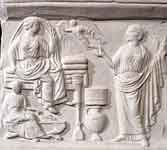|
|
Heirat im antiken Griechenland und einige Bemerkungen über Frauen (in the "Tereus") makes them lament, "We women are nothing;--happy indeed is our childhood, for THEN we are thoughtless; but when we attain maidenhood, lo! we are driven away from our homes, sold as merchandise, and compelled to marry and say 'All's well.'" , the orator, says, "The woman who goes out of her own home ought to be of such an age that when men meet her, the question is not 'Who is her husband?' but 'Whose mother is she?'" , On Wives & Hetaerae, c. 350 BC A pessimistic view
Theophrast (in Hieronymus Adversum Iovianianum) discusses if it is wise to get married. First he says that if the woman in rich, healthy and beautiful one could consider to marry. But in reality this almost never happens. A wife could be a problem to carry the philosophical studies. A wife would always comply that in comparison to other women she is very poor or why her husband looked one of the slave girls. To feed a poor woman is hard and to endure a rich woman is a torture. Why do we need children in order for our names to survive? If you become old probably your children want you to died soon to get your money who it is better to spent when you are alive. His final remarks are that the wise men is never alone because he is surrounded by all good friends who are alive or are now dead. His free spirit he can move to any place he wants. What he cannot reach with his body he can touch with his mind. And if other persons are not if he needs them then he can speak with the Gods.
Many women have been renowned for their beauty (indeed, as Euripides says, "an aged bard can still celebrate Memory"). Among them was Thargelia of Miletus, who had been married fourteen times, and who was very beautiful in looks as well as clever, according to the Sophist Hippias in his work entitled A Collection. , Athenaeus of Naucratis The Deipnosophists Book XIII Concerning Women
(Gorgon-kilIer), the daughter of Perseus. As soon as you hear the name you can understand the reason why it was given her. On the death of her husband, , Medea
Oh Zeus! Why have you established in the sunlit world
What says the Bible? Let the woman learn in silence with all subjection. But I suffer not a woman to teach, nor to usurp authority over the man, but to be in silence. For Adam was first formed, then Eve. And Adam was not deceived, but the woman being deceived was in the transgression...he is the image and glory of God: but the woman is the glory of the man. For the man is not of the woman: but the woman of the man. Neither was the man created for the woman; but the woman for the man
IMAGES
The Cartoon History of the Universe, Volumes 1-7 Larry Gonick's Family and inheritance bibliography of laws in ancient Greece (marriage, divorce, etc)
, Sarah Pomeroy , Sue Blundell
| ||||||||||||
